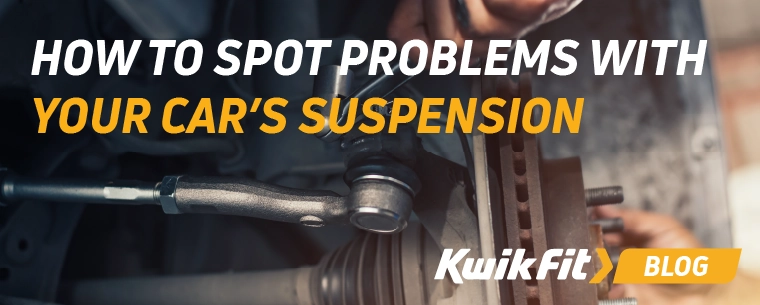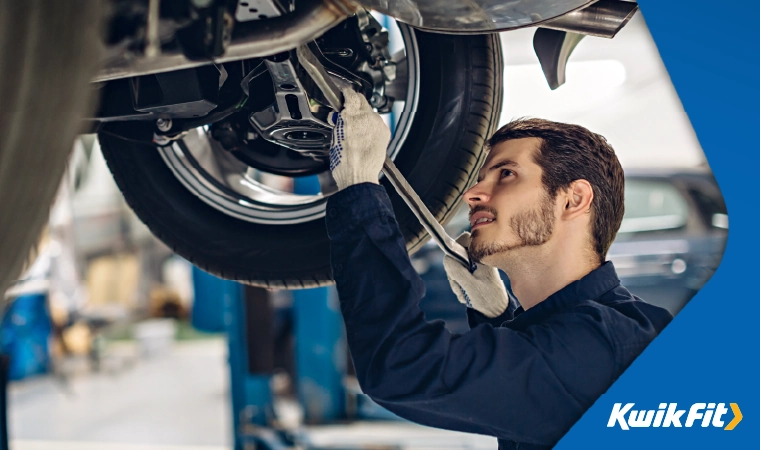How To Spot Problems With Your Car's Suspension
Jack Dreyer | Friday 22nd November 2024 12:00pm

Your car's suspension is a sophisticated system of springs, shock absorbers, and other components that all play a vital role in ensuring your comfort and safety while driving. Your suspension's key role is to limit vibrations and harsh undulations, ensuring a more comfortable driving experience. Even more importantly, by absorbing the impact from bumps and dips in the surface of the road, it helps to keep your tyres firmly in contact with the ground - which is essential for effective braking and handling. This means that problems with your suspension can put you at greater risk behind the wheel.
It's not always obvious if your suspension system has a fault or weakness. Often, a decrease in suspension performance is gradual, meaning it can be hard to detect. To help you understand whether your vehicle's suspension may need attention, here are a few key points to consider.
Does the ride feel bumpier?
One of the first tell-tale signs that your car's suspension has seen better days is that your journeys start to feel bumpier. You'll notice this issue most when you're travelling over uneven surfaces. A bumpier ride could be a sign that the parts of this system are simply suffering from general wear and tear, or it could indicate a more specific problem with one or more components. So, if your tyres are inflated to the correct level and you think your ride seems more jarring than normal, it's a good idea to get your suspension checked out.
Pulling to one side whilst driving?
If you notice your car pulling to one side while driving, it could indicate several suspension-related issues. One common cause is misaligned wheels, which can happen over time or after hitting a pothole or kerb. Worn suspension components, such as shock absorbers, struts, or springs, can also lead to uneven weight distribution, resulting in pulling to one side. If your vehicle pulls to one side, it's important to have it checked by a professional to prevent further damage, uneven tyre wear, and compromised road handling.
Are your tyres wearing out unevenly?
By law in the UK, tyres need to have a tread depth of at least 1.6mm, and many safety experts recommend getting replacements once the tread wears down to below 3mm. This means it's important to keep an eye on tread wear, especially as your tyres start getting close to the minimum. But there's another reason to keep tabs on the wear of your tyres, too. If the tread is uneven (for example, the outside or inside is worn more than the rest), this is a sure sign that something is wrong. One possible explanation for this issue is that there is a problem with your suspension system. For instance, springs may have loosened, or ball joints may have worn. However, there are other possible causes of uneven wear, including incorrect wheel alignment or incorrectly inflated tyres, so you may need to rule these out first.
Is the handling less responsive?
If you notice a pull or slight drift when turning corners, this could suggest something is wrong with your suspension or steering system. A responsive steering system is essential for safe handling, especially when navigating turns or avoiding obstacles. When your steering feels loose or less responsive, it can be due to worn suspension components or issues within the steering linkage itself.
If this problem is accompanied by a knocking sound while cornering, it's a good idea to get your suspension and steering inspected by a specialist technician. This could indicate a damaged anti-roll bar, a critical component that stabilises your car against lateral forces during turns. If it's compromised, the steering may feel unpredictable, posing a severe safety risk on the road.
Regular inspections and repairs of your vehicle's suspension and steering issues can help maintain your vehicle's handling and ensure your safety, especially in challenging driving conditions.

Does your vehicle dip at one corner?
Cars shouldn't dip unevenly at the corners. If you spot that one corner of your vehicle is much lower than the others, there's a chance you might have a damaged or worn spring. This could be accompanied by a knocking sound as you travel over potholes or speed bumps. To check if your suspension may be to blame, try pushing your weight down on the boot of your vehicle and listening out for any sounds. If you hear a squealing or creaking noise, this indicates you should get your suspension looked at.
If suspension isn't to blame, tyre pressure may be. Unequal tyre pressures can also mean your car sags at one corner.
Unusual noises that could signal issues
Your vehicle's suspension is designed to absorb shocks and maintain a smooth ride, so if you start hearing unfamiliar noises, it's a sign that something might be wrong with it.
Here are some common sounds to watch out for:
- Knocking sounds—If you hear knocks or bangs when driving over bumps, these can indicate issues. Ignoring these noises can lead to further wear on other parts of the suspension, potentially compromising your vehicle's safety and stability.
- Creaking - This could suggest wear on bushings, which are critical in dampening vibrations between parts. Worn-out bushings can create a squeaky sound as the suspension moves.
- Grinding - If you hear a grinding noise, particularly when turning, it might be due to a worn-out ball joint or a problem with the wheel bearing.
Does your car pass the bounce test?
Occasionally, you may want to try the 'bounce test' on your vehicle. This simply involves parking on a flat surface and pressing all your weight onto either the front or rear of your car. Then, watch how many times it bounces before it stabilises. If it bounces two or three times or more, it's likely that a spring has weakened or broken.
Pay attention to how 'bouncy' your car seems while driving it too. If your vehicle tends to nosedive when you brake, squat backwards when you accelerate or lean to the side when you corner, there could be an issue with the struts or shock absorbers.
If you have any concerns, get your car checked out
If you've noticed any of the signs of suspension issues mentioned above, it's crucial to have your car checked as soon as possible. Driving with a faulty suspension system can make it more difficult to control your vehicle, increasing the risk of accidents. Continuing to drive with suspension problems can also lead to further damage, resulting in higher repair costs down the line.
When it comes to such an important safety system, it's always better to be safe than sorry. Scheduling a suspension check with a professional will enable them to thoroughly assess your car and find any issues with the relevant components.
At Kwik Fit, we offer free suspension checks and provide a detailed report outlining any problems we find. Get in touch with your local Kwik Fit centre to book in your check today. For more information or questions regarding your vehicle, head over to our website and blog section. Ensuring your suspension system is in good condition will help you maintain optimal stability, comfort, and control on the road - keeping you and your passengers safe.
Any facts, figures and prices shown in our blog articles are correct at time of publication.
Featured Articles
Is it Illegal to Drive With One Headlight?
Saturday 19th July 2025
Wondering if it’s illegal to drive with one headlight? Learn about the safety risks and penalties of illegal blown bulbs and why you should fix them promptly.
Air Con in EVs & Hybrids: Experts Answer Your Questions
Monday 30th June 2025
Does air con drain EV batteries? Can you use the air con while charging an electric car? Find out the answers to these questions & more from Kwik Fit’s experts.
Why Is Your Car Making a Noise? Fixes & Tips
Friday 13th June 2025
When your car starts making unexpected noises, it can certainly be quite disconcerting; it may be nothing to worry about, but here’s what you need to know.









